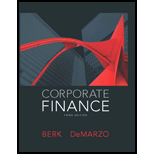
Concept explainers
You are trading in a market in which you know there are a few highly skilled traders who are better informed than you are. There are no transaction costs. Each day you randomly choose five stocks to buy and five stocks to sell (by, perhaps, throwing darts at a dartboard).
a. Over the long run will your strategy outperform, underperform, or have the same return as a buy and hold strategy of investing in the market portfolio?
b. Would your answer to part a change if all traders in the market were equally well informed and were equally skilled?
Want to see the full answer?
Check out a sample textbook solution
Chapter 13 Solutions
Corporate Finance
Additional Business Textbook Solutions
Financial Accounting (12th Edition) (What's New in Accounting)
Fundamentals of Cost Accounting
Horngren's Accounting (12th Edition)
Engineering Economy (17th Edition)
Foundations Of Finance
Advanced Financial Accounting
- Dont answer i will unhelpful with incorrect values . please comment i will write values.arrow_forwardWhat is corporate finance? explain the part of finance.arrow_forwardPfizer Pharmecuticals has a $21,000 par value bond outstanding that pays 10 percent annual interest. The current yield to maturity on such bonds in the market is 13 percent. Compute the price of the bonds for the following maturity dates: a. 30 years b. 15 yearsarrow_forward
- Purina Pet Food earned $74 million last year and paid out 20 percent of earnings in dividends. a. By how much did the company's retained earnings increase? b. With 36 million shares outstanding and a stock price of $18, what was the dividend yield?arrow_forwardProfessor Brown has just retired after 25 years with Jessup University. Her total pension funds have an accumulated value of $504,000, and her life expectancy is 25 more years. Her pension fund manager assumes he can earn a 9 percent return on her assets. What will be her yearly annuity for the next 25 years?arrow_forwardCaroline Moore has a contract in which she will receive the following payments for the next four years: $10,000, $11,000, $9,000, and $8,000. She will then receive an annuity of $13,000 a year from the end of the 4th through the end of the 10th year. The appropriate discount rate is 11 percent. What is the percent value of all future payments?arrow_forward
- Nick Weber wants to have $120,000 at the end of 10 years, and his only investment outlet is an 8 percent long-term certicate of deposit (compounded annually). With the certificate of deposit, he made an initial investment at the beginning of the year year. How much does Nick need to deposit to get the $120,000 at the end of 10 years. a. What amount could Nick pay at the end of each year annually for 10 years to achieve this same objective?arrow_forwardHigh Hand Nursery has total assests of $900,000, current liabilities of $202,000, and long-term liabilities of $104,000. There is $90,000 in preferred stock outstanding. Twenty thousand shares of common stock have been issued. a. Compute book value (net worth) per share. b. If there is $40,000 in earnings available to common stockholders for dividends, and the firm's stock has a P/E of 22 times earnings per share, what is the current price of the stock? c. What is the ratio of market value per share to book value per share?arrow_forwardNeed the WACC % WACC and Optimal Capital Structure F. Pierce Products Inc. is considering changing its capital structure. F. Pierce currently has no debt and no preferred stock, but it would like to add some debt to take advantage of the tax shield. Its investment banker has indicated that the pre-tax cost of debt under various possible capital structures would be as follows: Market Debt-to-Value Ratio (wd) Market Equity-to-Value Ratio (ws) Market Debt-toEquity Ratio (D/S) Before-Tax Cost ofDebt (rd) 0.0 1.0 0.00 6.0 % 0.10 0.90 0.1111 6.4 0.20 0.80 0.2500 7.0 0.30 0.70 0.4286 8.2 0.40 0.60 0.6667 10.0 F. Pierce uses the CAPM to estimate its cost of common equity, rs, and at the time of the analaysis the risk-free rate is 5%, the market risk premium is 7%, and the company's tax rate is 25%. F. Pierce estimates that its beta now (which is "unlevered" because it currently has no debt) is 1.4. Based on this information, what…arrow_forward
- Ned's Co. has an average collection period of 45 days and an operating cycle of 130 days. It has a policy of keeping at least $10 on hand as a minimum cash balance, and has a beginning cash balance for the first quarter of $20. Beginning receivables for the quarter amount to $35. Sales for the first and second quarters are expected to be $110 and $125, respectively, while purchases amount to 80% of the next quarter's forecast sales. The accounts payable period is 90 days. What are the cash disbursements for the first quarter? Question 4 options: $92 $88 $76 $100 $110arrow_forwardLiberal credit terms for customers is associated with a restrictive short-term financial policy. Question 3 options: True Falsearrow_forwardAn accounts payable period decrease would increase the length of a firm's cash cycle. Consider each in isolation. Question 6 options: True Falsearrow_forward

 Intermediate Financial Management (MindTap Course...FinanceISBN:9781337395083Author:Eugene F. Brigham, Phillip R. DavesPublisher:Cengage Learning
Intermediate Financial Management (MindTap Course...FinanceISBN:9781337395083Author:Eugene F. Brigham, Phillip R. DavesPublisher:Cengage Learning

